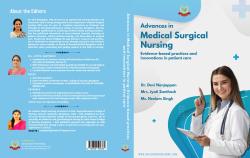INFECTIOUS DISEASE CONTROL AND IMMUNIZATION STRATEGIES
Abstract
Infectious disease control is a critical aspect of healthcare, requiring comprehensive strategies to prevent and manage the spread of infections, particularly in clinical settings. This chapter explores the principles and practices of infectious disease control, emphasizing the importance of hygiene, sterilization, and vaccination. It delves into the role of healthcare professionals in implementing infection prevention protocols, including hand hygiene, personal protective equipment (PPE) usage, and environmental sanitation. Additionally, the chapter highlights emerging threats such as antibiotic resistance and new infectious diseases, underscoring the need for continuous surveillance and research. Special attention is given to infection control measures in vulnerable populations, including immunocompromised patients and those undergoing surgical procedures. The chapter also examines the role of public health policies, guidelines, and global health initiatives in containing infectious diseases. By integrating scientific knowledge with practical applications, this chapter aims to equip healthcare professionals with the necessary tools to enhance patient safety and mitigate the risks associated with infectious diseases.









